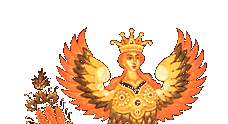The life of Oleg, the Seer, furnished material for several popular legends, one of which treats his death as predicted by the magicians.
6420 (912) Thus Oleg ruled in Kiev, and dwelt at peace with all nations. Now autumn came, and Oleg bethought him of his horse that he had caused to be well fed, yet had never mounted. For on one occasion he had made inquiry of the wonder-working magicians as to the ultimate cause of his death. Once magician replied: "O Prince, it is from the steed which you love and on which you ride that you shall meet your death." Oleg then reflected, and determined never to mount this horse or even to look upon it again. So he gave command that the horse should be properly fed, but never led into his presence. He thus let several years pass until he had attacked the Greeks. After he returned to Kiev, four years elapsed, but in the fifth he thought of the horse through which the magicians had foretold that he should meet is death. He thus summoned his senior squire and inquired as to the whereabouts of the horse which he had ordered to be fed and well cared for. The squire answered that he was dead. Oleg laughed and mocked the magician, exclaiming: "Soothsayers tell untruths, and their words are naught but falsehood. This horse is dead, but I am still alive."
Then he commanded that a horse should be saddled. "Let me see his bones," said he. He rode to the place where the bare bones and the skull lay. Dismounting from his horse, he laughed, and remarked: "Am I to receive my death from this skull?" And he stamped upon the skull with his foot. But a serpent crawled forth from it and bit him in the foot, so that in consequence he sickened and died. All the people mourned for him in great grief. They bore him away and buried him upon the hill which is called Shchekovitza. His tomb stands there to this day, and it is called the Tomb of Oleg.
|



